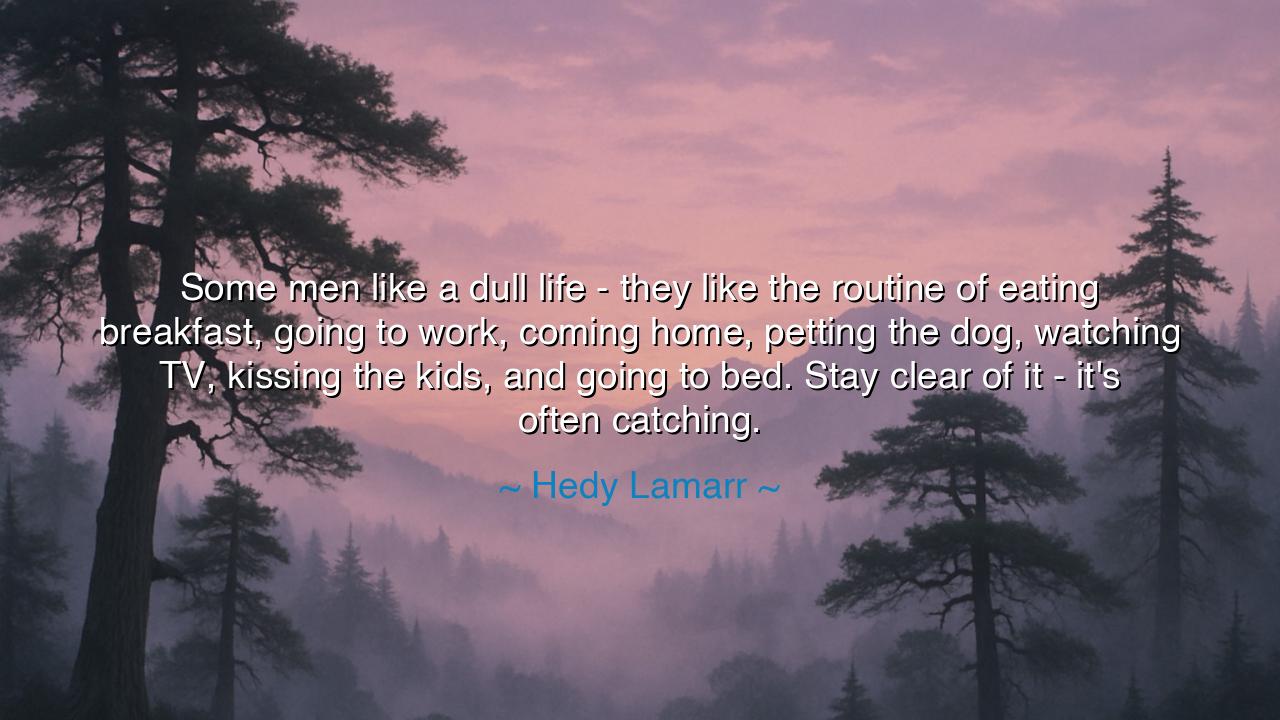
Some men like a dull life - they like the routine of eating
Some men like a dull life - they like the routine of eating breakfast, going to work, coming home, petting the dog, watching TV, kissing the kids, and going to bed. Stay clear of it - it's often catching.






“Some men like a dull life—they like the routine of eating breakfast, going to work, coming home, petting the dog, watching TV, kissing the kids, and going to bed. Stay clear of it—it’s often catching.” Thus spoke Hedy Lamarr, the radiant mind and spirit who was more than beauty—she was brilliance incarnate, a woman who lived as though the world were clay, to be reshaped by imagination. In these words, she delivers not a jest, but a warning—a call to vitality, to rebellion against the gray weight of monotony, and to the sacred duty of keeping one’s inner fire alive. Her voice carries across time like the ringing of a bell, reminding us that life is not meant to be endured in sameness, but to be lived with wonder.
Lamarr, known first to the world as a star of the silver screen, was also an inventor, a creator of the frequency-hopping technology that would one day become the foundation for Wi-Fi and Bluetooth. She was a woman who refused to be confined by the roles others set for her—actress, beauty, ornament. Her mind sought movement, her spirit sought challenge. When she warns against a “dull life,” she speaks not from arrogance, but from experience. She knew what it meant to live surrounded by comfort yet haunted by stagnation. Her words are a manifesto for the restless soul, for the one who knows that comfort without curiosity is a kind of death.
To “stay clear of it—it’s often catching” is a command to guard the spirit against the quiet decay of routine. For monotony, unlike catastrophe, does not strike all at once. It seeps in gently, disguised as safety. The dull life offers warmth and predictability, yet it slowly drains the blood of ambition. One morning, you wake and realize that your dreams have faded into habit, your laughter has been replaced by sighs, and your eyes no longer lift toward horizons unknown. Lamarr warns that this sickness of the soul spreads like a contagion: spend too long among those who have surrendered to dullness, and their stillness will become your own.
History is filled with those who heeded or ignored her wisdom. Consider the tale of Leonardo da Vinci, the eternal child of curiosity. He refused to live a life of repetition; each day, he sought a new mystery to unravel—whether in flight, in painting, or in the anatomy of the human hand. To him, the world was an infinite book, and each page demanded to be turned. And so, his legacy endures, for he lived in motion. Yet countless others, with equal potential, chose safety over exploration. Their names, now forgotten, remind us that the dull life leaves no mark upon the world.
Lamarr’s words also speak to the nature of creation itself. Every great work—whether of art, science, or spirit—requires the courage to step outside the circle of routine. To create is to challenge, to break the cycle of comfort, to wander into uncertainty. The dull life, by contrast, values repetition over revelation. It builds fences around the imagination and calls them peace. But true peace is not the absence of motion—it is the harmony found in purposeful movement, in the continual expansion of one’s mind and heart. The wise know that while rest is necessary, stagnation is deadly.
Yet her warning is not a condemnation of simplicity, but of complacency. There is a sacred rhythm in ordinary things—the breaking of bread, the embrace of family, the care for one’s home. But when these acts lose their awareness, when they are performed not with gratitude but with numbness, life becomes a sleepwalk. Lamarr reminds us to live awake, to infuse even the smallest act with presence and intention. The difference between a dull life and a luminous one is not in the routine itself, but in the spirit with which one walks through it.
So, my children of the restless soul, take this lesson deeply into your being: beware the dull life, for it does not announce itself—it seduces with comfort and captures with ease. Keep your mind alive with questions, your hands busy with creation, and your heart open to the unknown. Surround yourself with those who burn with curiosity, for their flame will keep yours from dimming. Each day, do something that breaks the circle—learn a new skill, speak to a stranger, create where you once consumed. For the world belongs not to those who repeat, but to those who reimagine.
In the end, Hedy Lamarr’s words are not a condemnation of the ordinary, but an invocation to live extraordinarily within it. She speaks as one who has walked both paths—glamour and obscurity, success and solitude—and found that what gives life meaning is not comfort, but aliveness. To live vividly, to think boldly, to seek endlessly—this is the antidote to the dull life. Let your spirit remain untamed, your curiosity unquenched, and your days filled with the light of wonder. For the dull life may be catching, but so too is the spark of the awakened soul—and it is that flame which turns existence into art.






AAdministratorAdministrator
Welcome, honored guests. Please leave a comment, we will respond soon